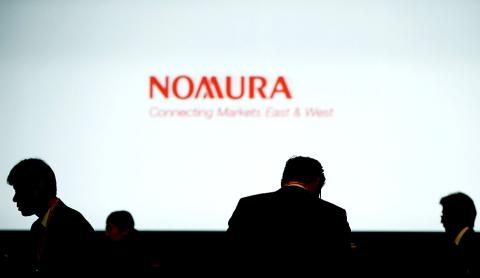Nomura Holdings Inc, Japan’s largest brokerage, plans to shut down its European equity operations as it cuts costs after years of failing to become profitable overseas, a person with knowledge of the matter said. The shares jumped.
The Tokyo-based securities firm would shutter equity research, sales, trading and underwriting for European stocks, according to the person.
An announcement of the move, along with job reductions in the Americas, could come as early as yesterday, the person said, asking not to be identified discussing private information.

Photo: Reuters
About 1,000 employees in Europe and the Americas could be affected, another person said.
Nomura, which had 3,433 employees in Europe and 2,501 in the Americas as of Dec. 31 last year, has been considering overhauling its overseas businesses since chief executive officer Koji Nagai in February postponed a goal to earn ¥50 billion (US$462 million) of pretax profit abroad.
Nomura might dismiss about 20 percent of its workforce in North America, people with knowledge of the situation said last month.
Kenji Yamashita, Nomura’s Tokyo-based spokesman, declined to comment on the reorganization in Europe.
The Nikkei newspaper reported the potential scale of the job cuts earlier yesterday.
Shares of Nomura surged 7.4 percent at the close of trading in Tokyo, the most in about two months.
That pared this year’s decline to 29 percent.
Global investment banks, including Credit Suisse Group AG, are cutting thousands of jobs as market volatility and low interest rates curb trading. Wall Street firms are poised to post lower revenue from trading and dealmaking for the first quarter of this year.
Nagai, who became chief executive officer in August 2012, has grown more bearish about prospects for the company’s overseas business in recent months.
The firm will cut costs overseas by trimming jobs and shrinking unproductive operations, he said in an interview in February.
Global market turmoil has affected overseas wholesale business and made it difficult to predict when the company could return to profit abroad, he said.
Nomura reported a ¥50.6 billion pretax loss at its European operations for the nine months to Dec. 31 last year.
The brokerage last posted an annual profit outside of Japan in the year ended March 2010. Its ranking for underwriting equity offerings in Europe dropped to 50th this year from 19th for all of last year, according to data compiled by Bloomberg.
The company’s equities business in Europe is part of its global markets division, which also handles fixed-income sales and trading. It also has investment banking and asset-management operations in the region.
The Japanese firm cut about 60 fixed-income and credit-derivative positions in London last year, a person familiar with the situation said at the time.
Nomura has gone through a series of expansions and contractions outside of Japan over the years. It bought bankrupt Lehman Brothers Holdings Inc’s European and Asian operations in 2008, only to pare back operations in the regions later, after costs and losses swelled.
As recently as December last year, Nagai said there was “still potential for growth in the Americas” and that the firm is seeking to double investment-banking revenue there over the next two to three years.

Quanta Computer Inc (廣達) chairman Barry Lam (林百里) is expected to share his views about the artificial intelligence (AI) industry’s prospects during his speech at the company’s 37th anniversary ceremony, as AI servers have become a new growth engine for the equipment manufacturing service provider. Lam’s speech is much anticipated, as Quanta has risen as one of the world’s major AI server suppliers. The company reported a 30 percent year-on-year growth in consolidated revenue to NT$1.41 trillion (US$43.35 billion) last year, thanks to fast-growing demand for servers, especially those with AI capabilities. The company told investors in November last year that

Intel Corp has named Tasha Chuang (莊蓓瑜) to lead Intel Taiwan in a bid to reinforce relations between the company and its Taiwanese partners. The appointment of Chuang as general manager for Intel Taiwan takes effect on Thursday, the firm said in a statement yesterday. Chuang is to lead her team in Taiwan to pursue product development and sales growth in an effort to reinforce the company’s ties with its partners and clients, Intel said. Chuang was previously in charge of managing Intel’s ties with leading Taiwanese PC brand Asustek Computer Inc (華碩), which included helping Asustek strengthen its global businesses, the company

Taiwanese suppliers to Taiwan Semiconductor Manufacturing Co. (TSMC, 台積電) are expected to follow the contract chipmaker’s step to invest in the US, but their relocation may be seven to eight years away, Minister of Economic Affairs J.W. Kuo (郭智輝) said yesterday. When asked by opposition Chinese Nationalist Party (KMT) Legislator Niu Hsu-ting (牛煦庭) in the legislature about growing concerns that TSMC’s huge investments in the US will prompt its suppliers to follow suit, Kuo said based on the chipmaker’s current limited production volume, it is unlikely to lead its supply chain to go there for now. “Unless TSMC completes its planned six

TikTok abounds with viral videos accusing prestigious brands of secretly manufacturing luxury goods in China so they can be sold at cut prices. However, while these “revelations” are spurious, behind them lurks a well-oiled machine for selling counterfeit goods that is making the most of the confusion surrounding trade tariffs. Chinese content creators who portray themselves as workers or subcontractors in the luxury goods business claim that Beijing has lifted confidentiality clauses on local subcontractors as a way to respond to the huge hike in customs duties imposed on China by US President Donald Trump. They say this Chinese decision, of which Agence